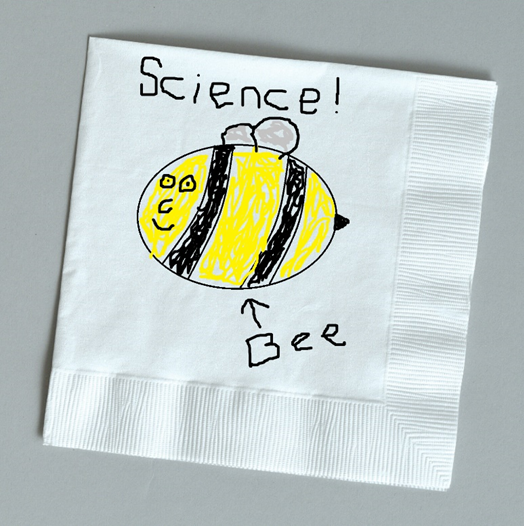PRINCETON, N.J.—A recent study by the Princeton Institute of Science and Sociology (P.I.S.S.) has found that keeping a personal colony of bees can have tremendous effects on personal health.
“The bees have a tremendous effect on our bodies,” said Institute Director Dr. Angstrom H. Troubadour. “It cannot be overstated how tremendous these effects are, especially in relation to personal health.” When asked to elaborate, Troubadour closed his eyes and pretended he couldn’t hear our questions.
“What? What? Speak up puny child,” said Troubadour, before reaching for a reporter’s car keys and attempting to drive off in our company Camry. The doctor was asked to leave, and come back when he feels better.
Luckily, the Internet Chronicle staff contains a vast collection of our nation’s brightest minds, and were able to dissect the report in his absence. The finalized report seems to be written in crayon on a loose collection of bar napkins. One such napkin held a crudely drawn picture of a bee, with his stinger out. Deep crimson stains of blood coat several pages, though it is not clear whether this is the blood of the scientists or test subjects. Frankly, it is not our job to question the source of the blood, for Chronicle editors operate with a deep understanding of the significance of bloodletting among employees, every now and then, two or three times a week.
The key thesis of the study claims that by keeping a personal collection of bees, and by keeping these bees in a glass tube, one can lower their stress levels and raise their expected life span. How it’s done is simple: the tube of bees is always kept on one’s person. Sometimes just holding the tube and experiencing the warm vibration from within is enough. But it is when conflict or disagreements arise that the true power of a bee tube is revealed: In a single therapeutic motion, a person – both a caregiver and patient becoming one in the same in that moment – might administer a tube-shattering blow to the recipient across the head or face, releasing the wrath of the bees upon patient no. 2.
The study goes on to state that during trials the bees were used to avoid DUI arrests, settle domestic disputes, and prevent physical harm to the user.
We spoke to Daniel, a 57-year-old practitioner of this method.
“The bees are fuckin’ great man, let me tell you,” said Daniel, who asked that his last name be withheld for legal reasons. “Some poor bastard wants me to move my car from the handicap space. I says to him, I says, ‘HOW DO YOU LIKE SOME BEES YOU STUPID PIECE OF SHIT!’ And then I bash ‘em! Gets ‘em every time!”
No further statements were taken, as Daniel began threatening our reporter with his tube of bees, sharp with freshly broken glass, and some bees still inside.
Naturally, any time animals are involved in science there is bound to be backlash from animal rights activists.
Animal rights activist and NFL Hall of Fame quarterback Michael Vick insists the practice is safe for everyone involved, especially the bees, who so enjoy the practice of medical stinging.
“I see no way in which this would harm the bees” said Vick, an ASPCA advocate. “I have always done what is right for animals, and I can personally vouch for the safety of all bees involved in this experiment.”
We at the Internet Chronicle stand firmly with Mr. Vick and all he has done for the animal rights movement, but we felt that a second opinion was necessary to gain full confidence in the safety of the bees. Therefore, our journalists covered the most allergic newsroom intern in honey, and sent him out to the McDonald’s dumpster on Tremont Avenue, to get a word directly from the bees themselves.
The following had to be taken from an audio transcript as our cub reporter was stung several times and died on the scene.
Unnamed and uncredited Chronicle intern: Obviously this experiment was conducted without the consent of the bees involved. How do you perceive the treatment of your subjects?
Bee Queen, Hive 1,302,907: Buzz buzzz buzzzz buzz buzzzzz buzz, buzz buzzz buzz buzzbuzzbuzz buzz buzz.
Reporter: I see, and do you feel threatened?
Bee Queen: Buzzzz Buzzbuzz buzz buzzz buzz.
Reporter: I understand your concerns, although FUCK SHIT OH GOD IT STINGS PLEASE GOD KILL M-
Although the topic of trapping bees and weaponizing them is controversial in the bee community, our lawyers have confidently informed Chronicle editors that the opinions of insects have no legal bearing, and can safely “bee” ignored.
Ask your doctor about this breakthrough medical advancement, and try it out for yourself, or simply reach out to [email protected] and we will mail you a loose box of assorted bees and wasps. No insurance necessary.






